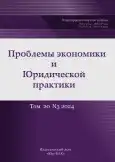Problematic Legal Issues of Forcing to Conclude Contracts for Water Supply and (or) Diversion by Means of State Melioration Systems or Hydraulic Structures: The Purpose of Legal Regulation and the Principle of State Efficiency
- Authors: Sedova Z.I.1
-
Affiliations:
- Russian State University of Justice
- Issue: Vol 20, No 3 (2024)
- Pages: 88-94
- Section: Private Law (Civil) Sciences
- URL: https://bakhtiniada.ru/2541-8025/article/view/263755
- EDN: https://elibrary.ru/XGNULI
- ID: 263755
Cite item
Abstract
Objective. The reason for writing this article is that electric power generating companies have faced coercion by federal state budgetary institutions operating melioration systems to conclude contracts for water supply and (or) water diversion services using state melioration systems and (or) separately located hydraulic structures attributed to state ownership (hereinafter—«water supply contract») in accordance with Federal Law No. 539-FZ dated 19.12.2022 «On Amendments to the Federal Law on Land Reclamation and the Water Code of the Russian Federation». The purpose of the article is to formulate a legal position on which entities are subject to the obligation to conclude a water supply contract under the law; to predict the consequences of obliging electric power companies to conclude a contract and to assess whether the principle of effective behavior of the state (principle of efficiency) is not violated as a result. Model. Methodological basis of the article—comparative legal analysis of the Russian legislation in the sphere of melioration with regulation of water use by subjects of electric power industry according to the Water Code of the Russian Federation and the Federal Law «On electric power industry» from 26.03.2003 № 35-FZ; synthesis and analysis in the form of allocation of general and special norms; formation of legal position on the issue of water use by subjects of electric utility. Conclusions. Obliging power generating companies to conclude contracts for water supply has a number of economic and legal consequences: it will increase heat tariffs for the population; it will make the business of a number of power plants unprofitable; it will violate the principle of balancing public and private interests; it will violate the principle of efficiency (effective behavior of the state). Scope of research / possibility of further use of scientific work results. The results of the study are part of the study of the principle of effective behavior of the state (principle of efficiency), the inadmissibility of violation of which refers to one of the types of negation of bad faith behavior as a method of legal regulation based on good faith. Practical importance. The conclusions of the article will be useful when courts consider cases on compulsion to conclude contracts on water supply by means of state melioration systems. Originality/value. The article is addressed to the legal scientific community, legal practitioners, may be useful for students of law faculties at universities.
Full Text
##article.viewOnOriginalSite##About the authors
Zhanna I. Sedova
Russian State University of Justice
Author for correspondence.
Email: Zhanna.sedova@EL5-energo.ru
ORCID iD: 0000-0001-6913-5542
SPIN-code: 4656-5908
Cand. Sci. (Law), Department of International Law
Russian Federation, MoscowReferences
- Burla V.M. Constitutional values as a scientific category: problems of definition, formalization, systematization // Actual problems of Russian law. 2024. № 3. P. 11–26.
- Gracheva O.S., Romanova A.A. Features of legal responsibility for land offenses: textbook / edited by O.S. Gracheva. Moscow: RUSAINS, 2019. 48 p.
- Dolinskaya V.V. National legislation of the Russian Federation and the needs of regulation of relations in the energy sector // Laws of Russia: experience, analysis, practice. 2023. № 2. P. 8–13.
- Kurbatov A.Ya. Entrepreneurial law: problems of theory and law enforcement: a monograph. Moscow: Justitsinform, 2022. 244 p.
- Scientific and practical commentary to the Federal Law of January 10, 2002 № 7-FZ «On Environmental Protection» (article-by-article) / L.P. Bernaz, I.N. Jochkina, N.V. Kichigin et al.; ed. by N.I. Khludeneva. Moscow: IZiSP, KONTRACT, 2018. 528 p.
- Nudnenko L.A. Fairness as a criterion for the balance of public and private interests // Constitutional and Municipal Law. 2021. № 1. P. 46–50.
- Pyshieva E.S. Land reclamation: land-legal, agrarian-legal and civilistic approaches: a monograph. Moscow: Justitsinform, 2018. 234 p.
- Sedova Zh.I. Principle of effective behavior of the state (principle of efficiency) // Perm Legal Almanac. 2024. № 7. —M.: Statute, 2024. —379 p., P. 63–79.
- Seregin D.I. Peculiarities of economic concentration control in the acquisition of fixed production assets and intangible assets // Journal of entrepreneurial and corporate law. 2020. № 1. P. 29–34.
- Haustov D.V. Review of new legislation // Ecological Law. 2023. № 5. P. 38–45.
- Shulakov A.A. Public interests and protective clauses in international private law // Actual problems of Russian law. 2023. № 7. P. 159–166.
Supplementary files








